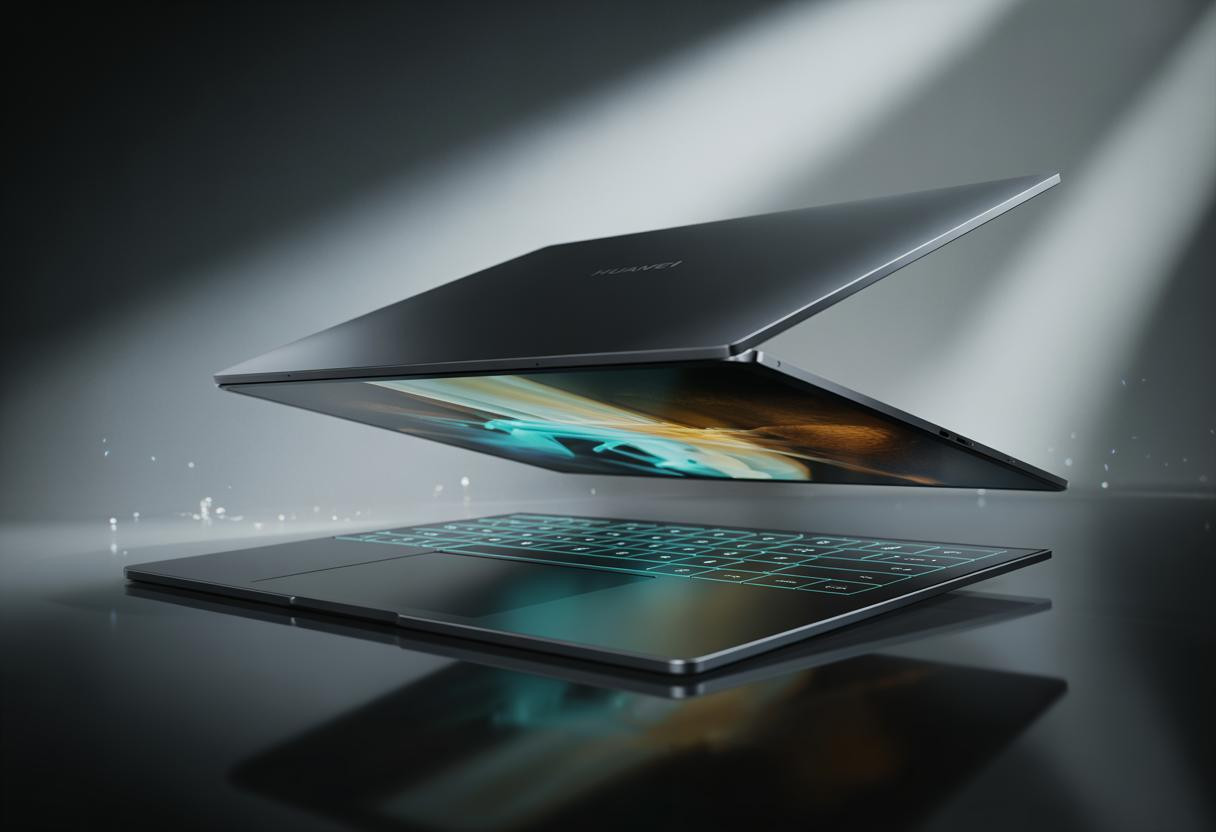Huawei has once again pushed the boundaries of mobile computing with its revolutionary MateBook Fold, an 18-inch foldable laptop that completely reimagines what a portable computer can be. Unveiled this week, this groundbreaking device notably lacks a physical keyboard in its default configuration and runs on Huawei’s proprietary HarmonyOS 5 instead of Windows. The bold design choices signal Huawei’s commitment to challenging conventional laptop design in an increasingly versatile computing landscape.
A truly transformative display experience
The MateBook Fold features an expansive 18-inch dual-layer LTPO OLED display that folds down to a compact 13-inch form factor. When fully opened, it delivers a stunning 3.3K resolution (3296 x 2472 pixels) with an immersive 4:3 aspect ratio—ideal for creative professionals and multitaskers who need maximum screen real estate.
“What we’re seeing with the MateBook Fold is nothing short of revolutionary for portable computing,” explains Dr. Amelia Chen, display technology analyst. “The dual-layer LTPO technology reduces power consumption by nearly 30% compared to standard OLED panels, addressing one of the biggest challenges in foldable devices.”
Reinventing the keyboard paradigm
Perhaps most striking is Huawei’s decision to eliminate the built-in physical keyboard entirely. Instead, users interact with a virtual keyboard on the bottom half of the folded display, or can attach an optional physical keyboard that weighs just 290 grams. This approach—akin to separating a butterfly’s wings from its body—allows for unprecedented flexibility in how the device can be used.
The detachable keyboard features 1.5mm key travel, providing a surprisingly satisfying typing experience despite its ultra-thin profile. For those who prefer the traditional laptop experience, it magnetically attaches to the lower screen portion when needed.
Cutting-edge hardware in an ultra-slim package
Inside its remarkably thin 7.3mm unfolded frame (weighing just 1.16kg), the MateBook Fold packs impressive specifications:
- Kirin X90 chipset (fully Chinese-manufactured ARM processor)
- Up to 32GB RAM and 2TB SSD storage
- 74.69Wh battery with estimated 8-12 hour runtime
- Advanced cooling system with ultra-thin diamond aluminum dual fans
The HarmonyOS difference
Running on HarmonyOS 5 represents a significant departure from Windows-based laptops. While potentially limiting software compatibility for some users, it offers seamless integration with Huawei’s growing ecosystem of devices—much like how smartphone battery performance benefits from optimized software.
“HarmonyOS on a laptop this size creates possibilities we haven’t seen before,” notes tech journalist Marco Rodriguez. “The fluid multitasking and gesture controls are specifically designed for large foldable displays in ways Windows simply isn’t.”
Engineering marvels that make folding possible
The device employs what Huawei calls the “world’s largest basalt water drop hinge,” supporting angles between 30° and 150°. This precision engineering—reminiscent of how nature’s delicate balances require perfect mechanisms—enables the MateBook to transform between tablet and laptop modes without compromising structural integrity.
Who is this innovative device for?
The MateBook Fold targets creative professionals, executives, and tech enthusiasts who prioritize screen real estate and portability over traditional keyboard setups. Its versatility makes it ideal for:
- Digital artists and designers requiring precise touch input
- Executives who frequently present to clients or small groups
- Early adopters seeking the most innovative computing experiences
- Travelers who need maximum versatility in minimal space
Will this unconventional approach reshape mobile computing?
Like finding tranquility in remote natural settings, sometimes breaking from convention leads to unexpected benefits. While the absence of a physical keyboard may initially seem limiting, the freedom it provides could well represent the future of portable computing—where our devices adapt to our needs rather than forcing us to adapt to them.
